The Cambridge History of China. Vol. 12: Republican China, 1912-1949, Part 1
Подождите немного. Документ загружается.

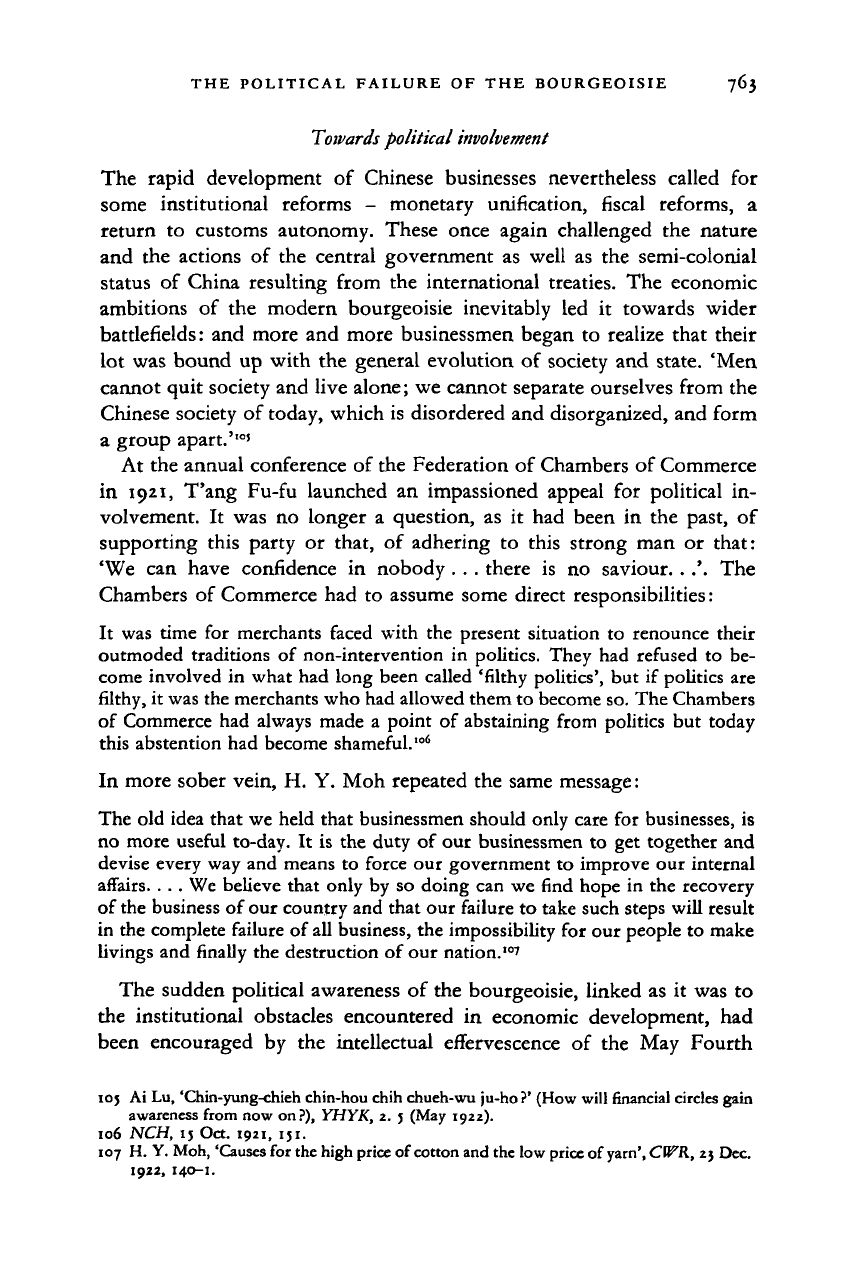
THE POLITICAL FAILURE OF THE BOURGEOISIE 763
Towards
political
involvement
The rapid development of Chinese businesses nevertheless called for
some institutional reforms - monetary unification, fiscal reforms, a
return to customs autonomy. These once again challenged the nature
and the actions of the central government as well as the semi-colonial
status of China resulting from the international treaties. The economic
ambitions of the modern bourgeoisie inevitably led it towards wider
battlefields: and more and more businessmen began to realize that their
lot was bound up with the general evolution of society and state. 'Men
cannot quit society and live alone; we cannot separate ourselves from the
Chinese society of today, which is disordered and disorganized, and form
a group apart.'
10
'
At the annual conference of the Federation of Chambers of Commerce
in 1921, T'ang Fu-fu launched an impassioned appeal for political in-
volvement. It was no longer a question, as it had been in the past, of
supporting this party or that, of adhering to this strong man or that:
'We can have confidence in nobody . . . there is no saviour. . .'. The
Chambers of Commerce had to assume some direct responsibilities:
It was time for merchants faced with the present situation to renounce their
outmoded traditions of non-intervention in politics. They had refused to be-
come involved in what had long been called 'filthy polities', but if politics are
filthy, it was the merchants who had allowed them to become
so.
The Chambers
of Commerce had always made a point of abstaining from politics but today
this abstention had become shameful.
106
In more sober vein, H. Y. Moh repeated the same message:
The old idea that we held that businessmen should only care for businesses, is
no more useful to-day. It is the duty of our businessmen to get together and
devise every way and means to force our government to improve our internal
affairs. . . . We believe that only by so doing can we find hope in the recovery
of
the
business of our country and that our failure to take such steps will result
in the complete failure of
all
business, the impossibility for our people to make
livings and
finally
the destruction of our nation.
107
The sudden political awareness of the bourgeoisie, linked as it was to
the institutional obstacles encountered in economic development, had
been encouraged by the intellectual effervescence of the May Fourth
105 Ai Lu, 'Chin-yung-chieh chin-hou chih chueh-wu ju-ho?' (How will financial circles gain
awareness from now on?),
YHYK,
2. 5 (May 1922).
106 NCH, 15 Oct. 1921, 151.
107 H. Y. Moh, 'Causes for the high price of cotton and the low price of
yarn',
CWK, 23 Dec.
1922,
140-1.
Cambridge Histories Online © Cambridge University Press, 2008
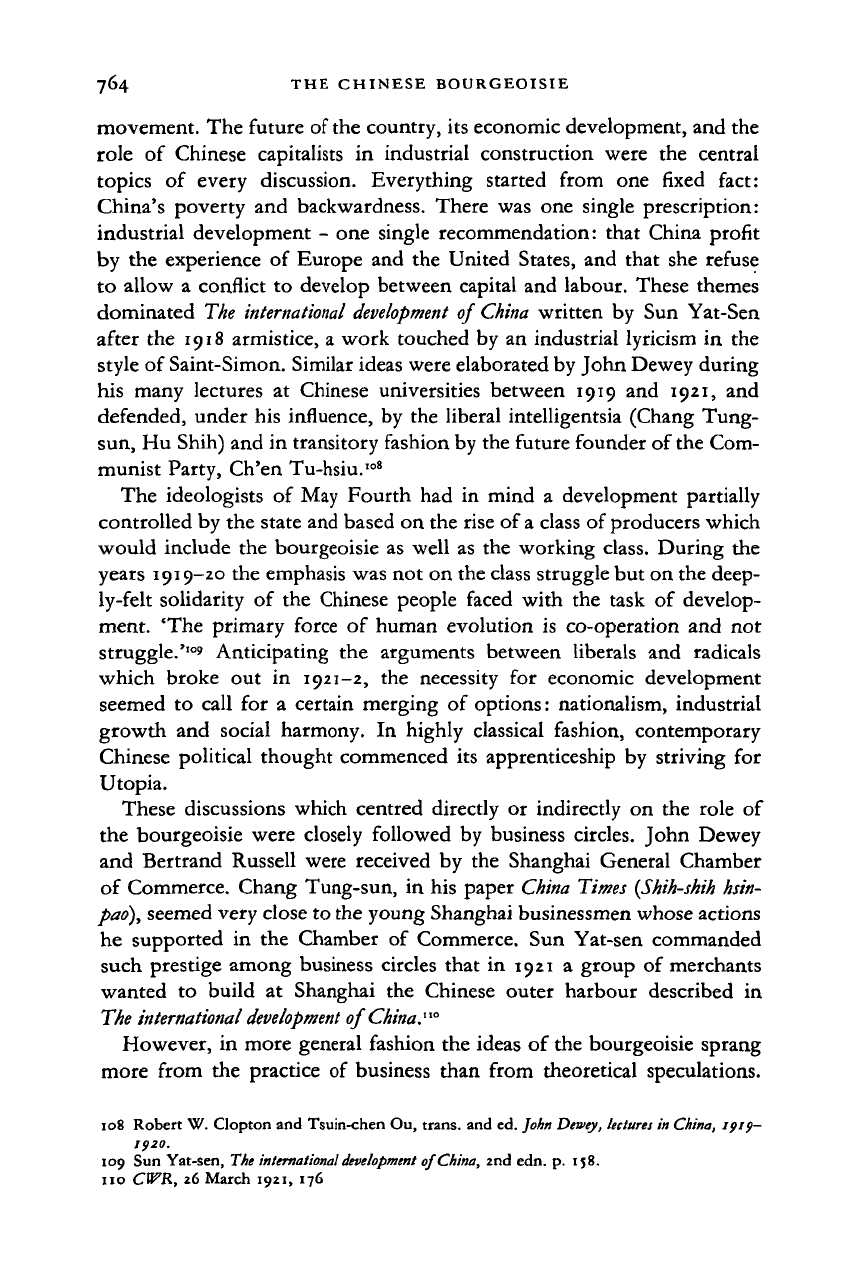
764 THE CHINESE BOURGEOISIE
movement. The future of the country, its economic development, and the
role of Chinese capitalists in industrial construction were the central
topics of every discussion. Everything started from one fixed fact:
China's poverty and backwardness. There was one single prescription:
industrial development - one single recommendation: that China profit
by the experience of Europe and the United States, and that she refuse
to allow a conflict to develop between capital and labour. These themes
dominated The international
development
of China written by Sun Yat-Sen
after the 1918 armistice, a work touched by an industrial lyricism in the
style of Saint-Simon. Similar ideas were elaborated by John Dewey during
his many lectures at Chinese universities between 1919 and 1921, and
defended, under his influence, by the liberal intelligentsia (Chang Tung-
sun, Hu Shih) and in transitory fashion by the future founder of the Com-
munist Party, Ch'en Tu-hsiu.
1
"
8
The ideologists of May Fourth had in mind a development partially
controlled by the state and based on the rise of
a
class of producers which
would include the bourgeoisie as well as the working class. During the
years 1919-20 the emphasis was not on the class struggle but on the deep-
ly-felt solidarity of the Chinese people faced with the task of develop-
ment. 'The primary force of human evolution is co-operation and not
struggle.'
10
' Anticipating the arguments between liberals and radicals
which broke out in 1921-2, the necessity for economic development
seemed to call for a certain merging of options: nationalism, industrial
growth and social harmony. In highly classical fashion, contemporary
Chinese political thought commenced its apprenticeship by striving for
Utopia.
These discussions which centred directly or indirectly on the role of
the bourgeoisie were closely followed by business circles. John Dewey
and Bertrand Russell were received by the Shanghai General Chamber
of Commerce. Chang Tung-sun, in his paper
China
Times
(Shih-shih
hsin-
pad),
seemed very close to the young Shanghai businessmen whose actions
he supported in the Chamber of Commerce. Sun Yat-sen commanded
such prestige among business circles that in 1921 a group of merchants
wanted to build at Shanghai the Chinese outer harbour described in
The international
development
of China."
0
However, in more general fashion the ideas of the bourgeoisie sprang
more from the practice of business than from theoretical speculations.
108 Robert W. Clopton and Tsuin-chen Ou, trans, and ed.
John
Dewey,
lectures
in
China,
1919—
1920.
109 Sun Yat-sen, The
international development
of China, 2nd edn. p. 158.
no CWK, 26 March 1921, 176
Cambridge Histories Online © Cambridge University Press, 2008
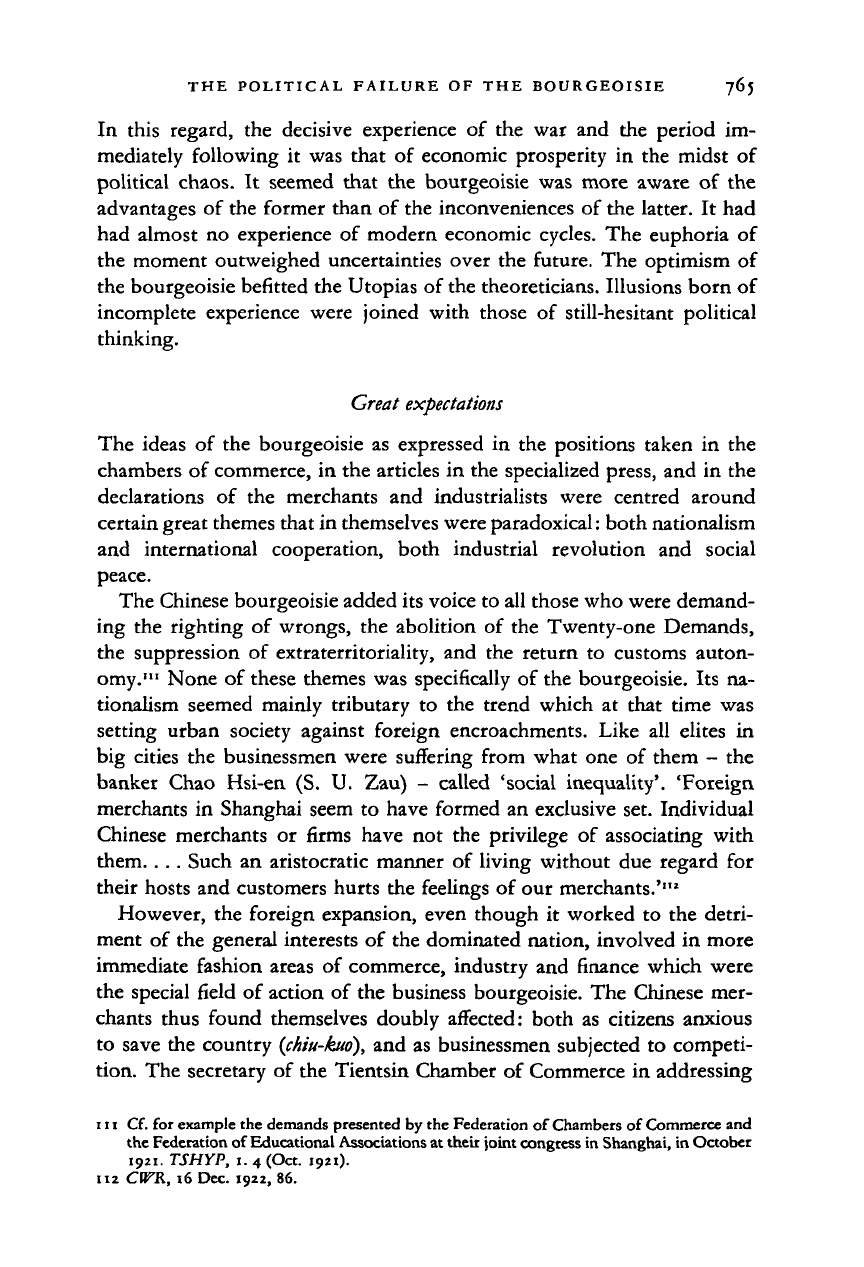
THE POLITICAL FAILURE OF THE BOURGEOISIE 765
In this regard,
the
decisive experience
of the war and the
period
im-
mediately following
it was
that
of
economic prosperity
in the
midst
of
political chaos.
It
seemed that
the
bourgeoisie
was
more aware
of the
advantages
of
the former than
of
the inconveniences
of
the latter.
It had
had almost
no
experience
of
modern economic cycles.
The
euphoria
of
the moment outweighed uncertainties over
the
future.
The
optimism
of
the bourgeoisie befitted the Utopias
of
the theoreticians. Illusions born
of
incomplete experience were joined with those
of
still-hesitant political
thinking.
Great expectations
The ideas
of the
bourgeoisie
as
expressed
in the
positions taken
in the
chambers
of
commerce,
in
the articles
in the
specialized press,
and in the
declarations
of the
merchants
and
industrialists were centred around
certain great themes that in themselves were paradoxical: both nationalism
and international cooperation, both industrial revolution
and
social
peace.
The Chinese bourgeoisie added its voice
to
all those who were demand-
ing
the
righting
of
wrongs,
the
abolition
of the
Twenty-one Demands,
the suppression
of
extraterritoriality,
and the
return
to
customs auton-
omy.
1
" None
of
these themes was specifically
of
the bourgeoisie.
Its na-
tionalism seemed mainly tributary
to the
trend which
at
that time
was
setting urban society against foreign encroachments. Like
all
elites
in
big cities
the
businessmen were suffering from what
one of
them
- the
banker Chao Hsi-en
(S. U. Zau) -
called 'social inequality'. 'Foreign
merchants
in
Shanghai seem
to
have formed
an
exclusive
set.
Individual
Chinese merchants
or
firms have
not the
privilege
of
associating with
them.
. ..
Such
an
aristocratic manner
of
living without
due
regard
for
their hosts
and
customers hurts
the
feelings
of
our merchants.'"'
However,
the
foreign expansion, even though
it
worked
to the
detri-
ment
of the
general interests
of the
dominated nation, involved
in
more
immediate fashion areas
of
commerce, industry
and
finance which were
the special field
of
action
of
the business bourgeoisie.
The
Chinese
mer-
chants thus found themselves doubly affected: both
as
citizens anxious
to save
the
country
(chiu-kuo),
and as
businessmen subjected
to
competi-
tion.
The
secretary
of
the Tientsin Chamber
of
Commerce
in
addressing
in
C(. for
example
the
demands presented
by
the Federation
of
Chambers
of
Commerce and
the Federation of Educational Associations at their joint congress in Shanghai, in October
1921.
TSHYP,
1. 4
(Oct. 1921).
112
CWK,
16 Dec. 1922, 86.
Cambridge Histories Online © Cambridge University Press, 2008
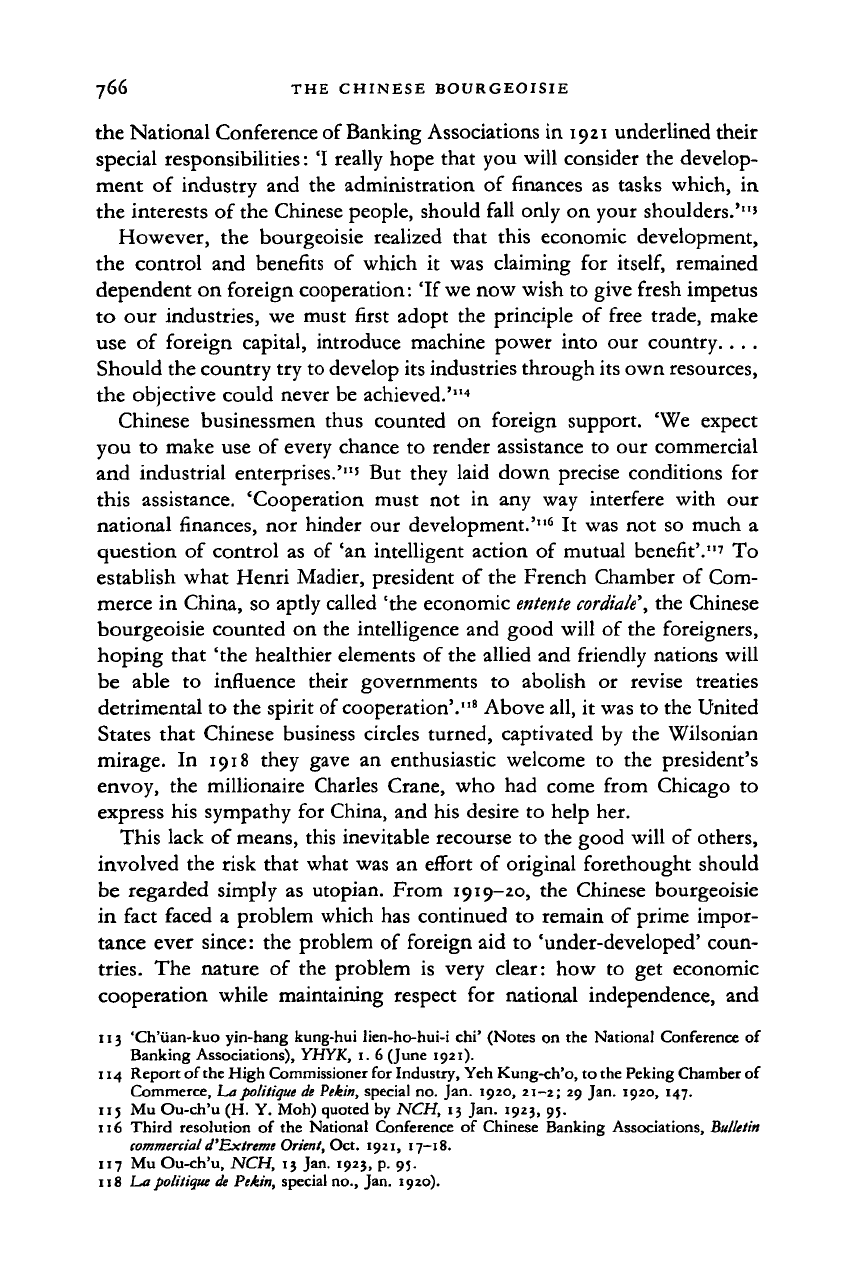
766 THE CHINESE BOURGEOISIE
the National Conference of Banking Associations in 1921 underlined their
special responsibilities: 'I really hope that you will consider the develop-
ment of industry and the administration of finances as tasks which, in
the interests of the Chinese people, should fall only on your shoulders.'"
5
However, the bourgeoisie realized that this economic development,
the control and benefits of which it was claiming for
itself,
remained
dependent on foreign cooperation: 'If we now wish to give fresh impetus
to our industries, we must first adopt the principle of free trade, make
use of foreign capital, introduce machine power into our country. . . .
Should the country try to develop its industries through its own resources,
the objective could never be achieved.'"
4
Chinese businessmen thus counted on foreign support. 'We expect
you to make use of every chance to render assistance to our commercial
and industrial enterprises.'"' But they laid down precise conditions for
this assistance. 'Cooperation must not in any way interfere with our
national finances, nor hinder our development.'"
6
It was not so much a
question of control as of 'an intelligent action of mutual benefit'."
7
To
establish what Henri Madier, president of the French Chamber of Com-
merce in China, so aptly called 'the economic
entente
cordiale\
the Chinese
bourgeoisie counted on the intelligence and good will of the foreigners,
hoping that 'the healthier elements of the allied and friendly nations will
be able to influence their governments to abolish or revise treaties
detrimental to the spirit of cooperation'."
8
Above all, it was to the United
States that Chinese business circles turned, captivated by the Wilsonian
mirage. In 1918 they gave an enthusiastic welcome to the president's
envoy, the millionaire Charles Crane, who had come from Chicago to
express his sympathy for China, and his desire to help her.
This lack of means, this inevitable recourse to the good will of others,
involved the risk that what was an effort of original forethought should
be regarded simply as Utopian. From 1919-20, the Chinese bourgeoisie
in fact faced a problem which has continued to remain of prime impor-
tance ever since: the problem of foreign aid to 'under-developed' coun-
tries.
The nature of the problem is very clear: how to get economic
cooperation while maintaining respect for national independence, and
113 'Ch'iian-kuo yin-hang kung-hui lien-ho-hui-i chi' (Notes on the National Conference of
Banking Associations),
YHYK,
i. 6 (June 1921).
114 Report of the High Commissioner for Industry, Yeh Kung-ch'o, to the Peking Chamber of
Commerce, La
po/i/ique
de
Pekin,
special no. Jan. 1920, 21-2; 29 Jan. 1920, 147.
115 Mu Ou-ch'u (H. Y. Moh) quoted by NCH, 13 Jan. 1923, 95.
116 Third resolution of the National Conference of Chinese Banking Associations, Bulletin
commercial
d'Extreme Orient, Oct. 1921, 17-18.
117 Mu Ou-ch'u, NCH, 13 Jan. 1923, p. 95.
118 La
politique
de Pekin, special no., Jan. 1920).
Cambridge Histories Online © Cambridge University Press, 2008
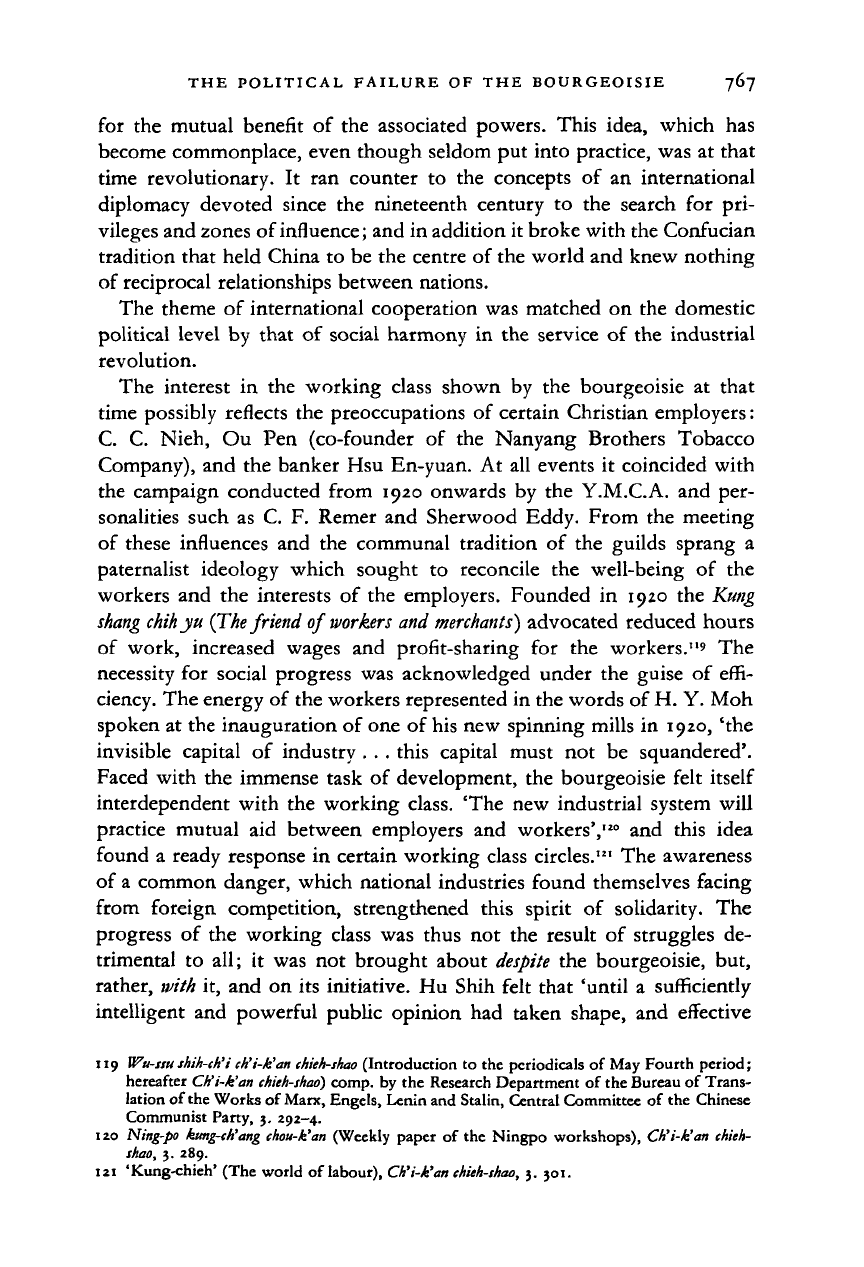
THE POLITICAL FAILURE OF THE BOURGEOISIE 767
for the mutual benefit of the associated powers. This idea, which has
become commonplace, even though seldom put into practice, was at that
time revolutionary. It ran counter to the concepts of an international
diplomacy devoted since the nineteenth century to the search for pri-
vileges and 2ones of influence; and in addition it broke with the Confucian
tradition that held China to be the centre of the world and knew nothing
of reciprocal relationships between nations.
The theme of international cooperation was matched on the domestic
political level by that of social harmony in the service of the industrial
revolution.
The interest in the working class shown by the bourgeoisie at that
time possibly reflects the preoccupations of certain Christian employers:
C. C. Nieh, Ou Pen (co-founder of the Nanyang Brothers Tobacco
Company), and the banker Hsu En-yuan. At all events it coincided with
the campaign conducted from 1920 onwards by the Y.M.C.A. and per-
sonalities such as C. F. Remer and Sherwood Eddy. From the meeting
of these influences and the communal tradition of the guilds sprang a
paternalist ideology which sought to reconcile the well-being of the
workers and the interests of the employers. Founded in 1920 the
Kung
shang
chikju (The friend of
workers
and
merchants)
advocated reduced hours
of work, increased wages and profit-sharing for the workers."
9
The
necessity for social progress was acknowledged under the guise of effi-
ciency. The energy of the workers represented in the words of H. Y. Moh
spoken at the inauguration of one of his new spinning mills in 1920, 'the
invisible capital of industry . . . this capital must not be squandered'.
Faced with the immense task of development, the bourgeoisie felt itself
interdependent with the working class. 'The new industrial system will
practice mutual aid between employers and workers',
120
and this idea
found a ready response in certain working class circles.
121
The awareness
of a common danger, which national industries found themselves facing
from foreign competition, strengthened this spirit of solidarity. The
progress of the working class was thus not the result of struggles de-
trimental to all; it was not brought about
despite
the bourgeoisie, but,
rather, with it, and on its initiative. Hu Shih felt that 'until a sufficiently
intelligent and powerful public opinion had taken shape, and effective
119
Wu-ssu shih-ch'i ch'i-k'an chieh-shao
(Introduction to the periodicals of May Fourth period;
hereafter Ch'i-k'an
chieh-shao)
comp. by the Research Department of the Bureau of Trans-
lation of the Works of
Marx,
Engels, Lenin and Stalin, Central Committee of the Chinese
Communist Party, 3. 292-4.
120 Ning-po
kmg-ch'ang chou-k'an
(Weekly paper of the Ningpo workshops), Ch'i-k'an
chieh-
shao,
3. 289.
121 'Kung-chieh' (The world of labour), Ch'i-k'an
chieh-shao,
3. 301.
Cambridge Histories Online © Cambridge University Press, 2008
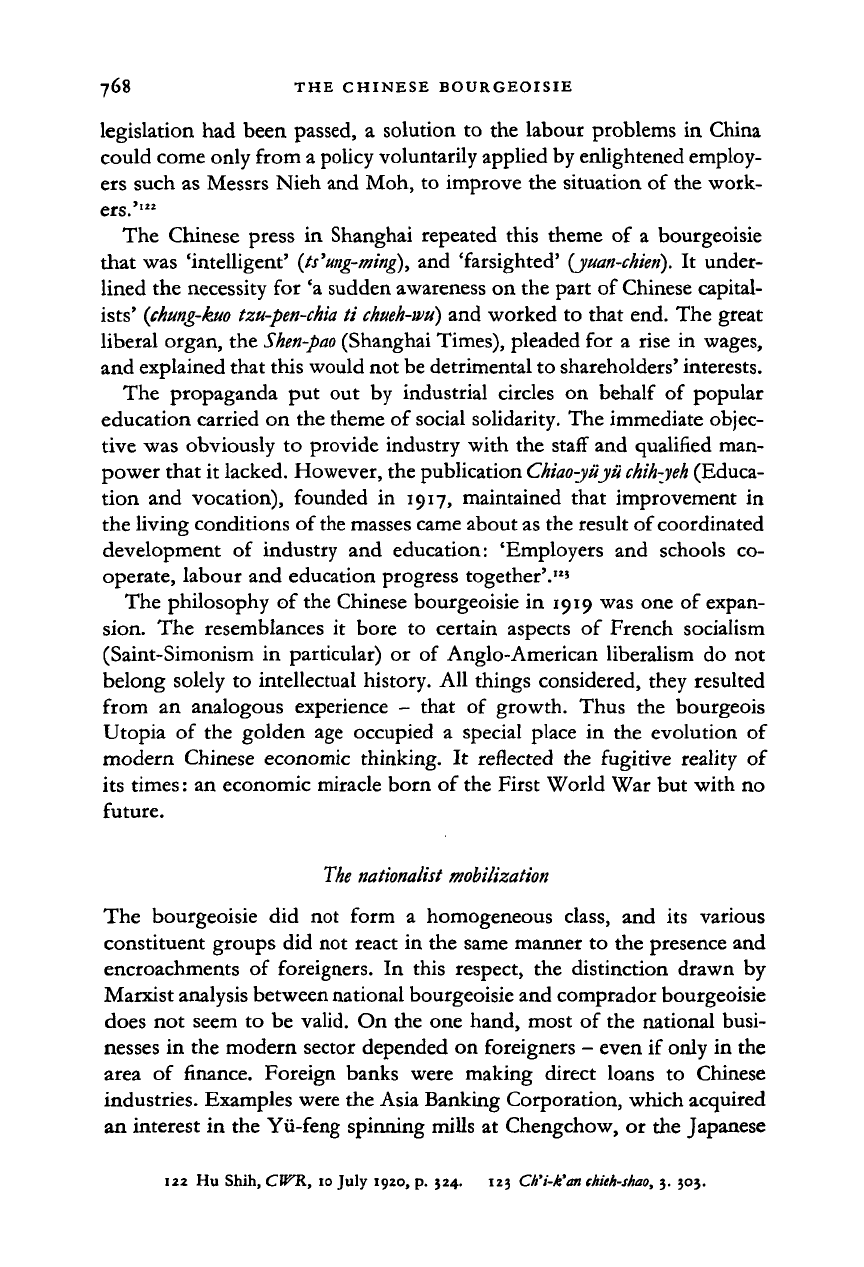
768 THE CHINESE BOURGEOISIE
legislation had been passed, a solution to the labour problems in China
could come only from a policy voluntarily applied by enlightened employ-
ers such as Messrs Nieh and Moh, to improve the situation of the work-
ers.'
1
"
The Chinese press in Shanghai repeated this theme of a bourgeoisie
that was 'intelligent'
(ts'ung-ming),
and 'farsighted'
(juan-chieri).
It under-
lined the necessity for 'a sudden awareness on the part of Chinese capital-
ists'
(chung-kuo tzu-pen-chia
ti
chueh-wu)
and worked to that end. The great
liberal organ, the
Shen-pao
(Shanghai Times), pleaded for a rise in wages,
and explained that this would not be detrimental to shareholders' interests.
The propaganda put out by industrial circles on behalf of popular
education carried on the theme of social solidarity. The immediate objec-
tive was obviously to provide industry with the staff and qualified man-
power that it lacked. However, the publication
Chiao-yiiyu chih-yeh
(Educa-
tion and vocation), founded in 1917, maintained that improvement in
the living conditions of
the
masses came about as the result of coordinated
development of industry and education: 'Employers and schools co-
operate, labour and education progress together'.
12
'
The philosophy of the Chinese bourgeoisie in 1919 was one of expan-
sion. The resemblances it bore to certain aspects of French socialism
(Saint-Simonism in particular) or of Anglo-American liberalism do not
belong solely to intellectual history. All things considered, they resulted
from an analogous experience - that of growth. Thus the bourgeois
Utopia of the golden age occupied a special place in the evolution of
modern Chinese economic thinking. It reflected the fugitive reality of
its times: an economic miracle born of the First World War but with no
future.
The nationalist mobilization
The bourgeoisie did not form a homogeneous class, and its various
constituent groups did not react in the same manner to the presence and
encroachments of foreigners. In this respect, the distinction drawn by
Marxist analysis between national bourgeoisie and comprador bourgeoisie
does not seem to be valid. On the one hand, most of the national busi-
nesses in the modern sector depended on foreigners - even if only in the
area of finance. Foreign banks were making direct loans to Chinese
industries. Examples were the Asia Banking Corporation, which acquired
an interest in the Yii-feng spinning mills at Chengchow, or the Japanese
122 Hu Shih, CWK, 10 July 1920, p. 524. 123 Ch'i-k'tm
chieh-shao,
3. 303.
Cambridge Histories Online © Cambridge University Press, 2008
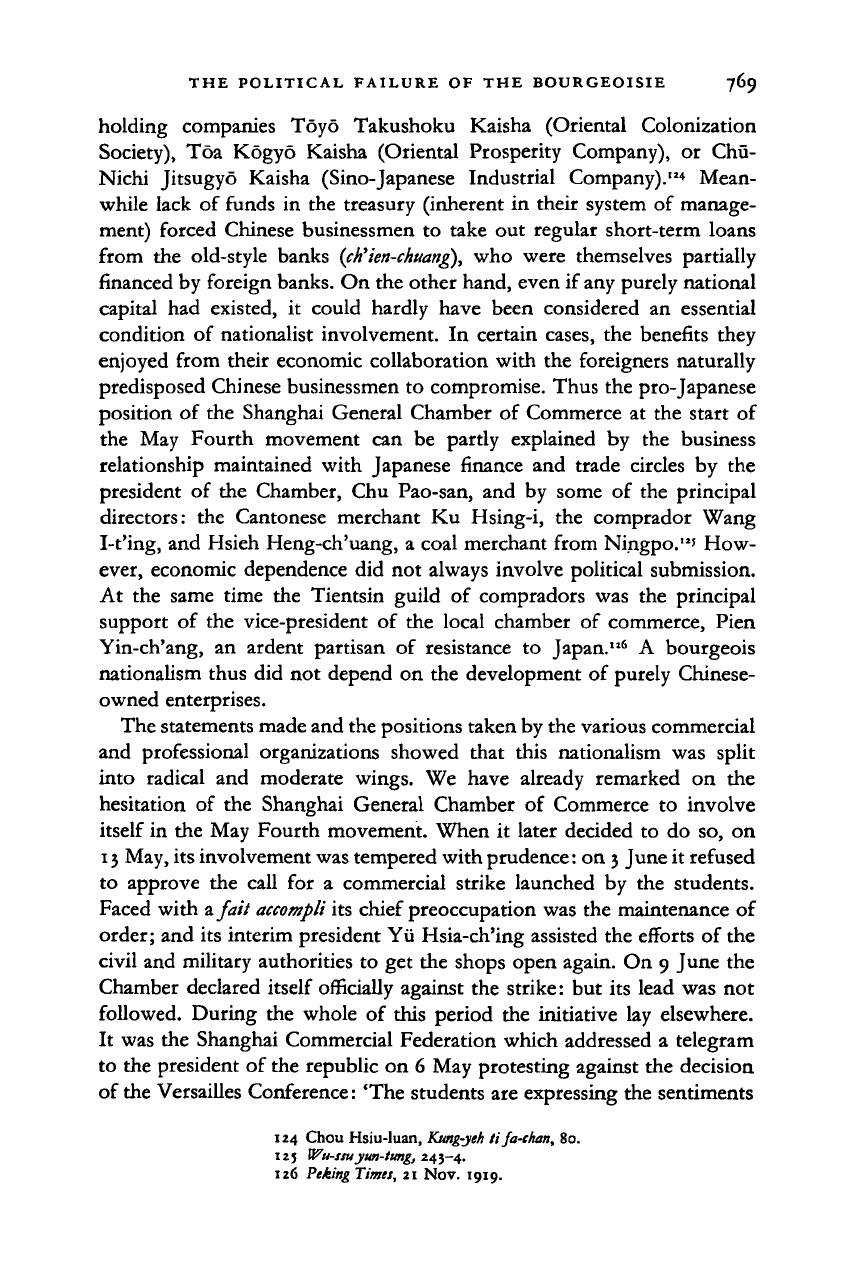
THE POLITICAL FAILURE OF THE BOURGEOISIE 769
holding companies Toyo Takushoku Kaisha (Oriental Colonization
Society),
Toa
Kogyo Kaisha (Oriental Prosperity Company),
or Chu-
Nichi Jitsugyo Kaisha (Sino-Japanese Industrial Company).
124
Mean-
while lack
of
funds
in the
treasury (inherent
in
their system
of
manage-
ment) forced Chinese businessmen
to
take
out
regular short-term loans
from
the
old-style banks
(ch'ien-chuang),
who
were themselves partially
financed by foreign banks.
On
the other hand, even
if
any purely national
capital
had
existed,
it
could hardly have been considered
an
essential
condition
of
nationalist involvement.
In
certain cases,
the
benefits they
enjoyed from their economic collaboration with
the
foreigners naturally
predisposed Chinese businessmen
to
compromise. Thus the pro-Japanese
position
of the
Shanghai General Chamber
of
Commerce
at the
start
of
the
May
Fourth movement
can be
partly explained
by the
business
relationship maintained with Japanese finance
and
trade circles
by the
president
of the
Chamber,
Chu
Pao-san,
and by
some
of the
principal
directors:
the
Cantonese merchant
Ku
Hsing-i,
the
comprador Wang
I-t'ing,
and
Hsieh Heng-ch'uang,
a
coal merchant from Ningpo.
12
' How-
ever, economic dependence
did not
always involve political submission.
At
the
same time
the
Tientsin guild
of
compradors
was the
principal
support
of the
vice-president
of the
local chamber
of
commerce, Pien
Yin-ch'ang,
an
ardent partisan
of
resistance
to
Japan."
6
A
bourgeois
nationalism thus
did not
depend
on the
development
of
purely Chinese-
owned enterprises.
The statements made and the positions taken by the various commercial
and professional organizations showed that this nationalism
was
split
into radical
and
moderate wings.
We
have already remarked
on the
hesitation
of the
Shanghai General Chamber
of
Commerce
to
involve
itself
in the May
Fourth movement. When
it
later decided
to do so, on
13 May, its involvement was tempered with prudence:
on
3
June it refused
to approve
the
call
for a
commercial strike launched
by the
students.
Faced with a. fait
accompli
its chief preoccupation was
the
maintenance
of
order;
and its
interim president Yii Hsia-ch'ing assisted
the
efforts
of
the
civil
and
military authorities
to get the
shops open again.
On 9
June
the
Chamber declared itself officially against
the
strike:
but its
lead
was not
followed. During
the
whole
of
this period
the
initiative
lay
elsewhere.
It was
the
Shanghai Commercial Federation which addressed
a
telegram
to
the
president
of
the republic
on 6
May protesting against
the
decision
of the Versailles Conference: 'The students are expressing
the
sentiments
124 Chou Hsiu-luan,
Kimg-yth
tifa-chan,
80.
125 Wu-ssu yun-tung, 243-4.
126 Peking Times,
21 Nov. 1919.
Cambridge Histories Online © Cambridge University Press, 2008
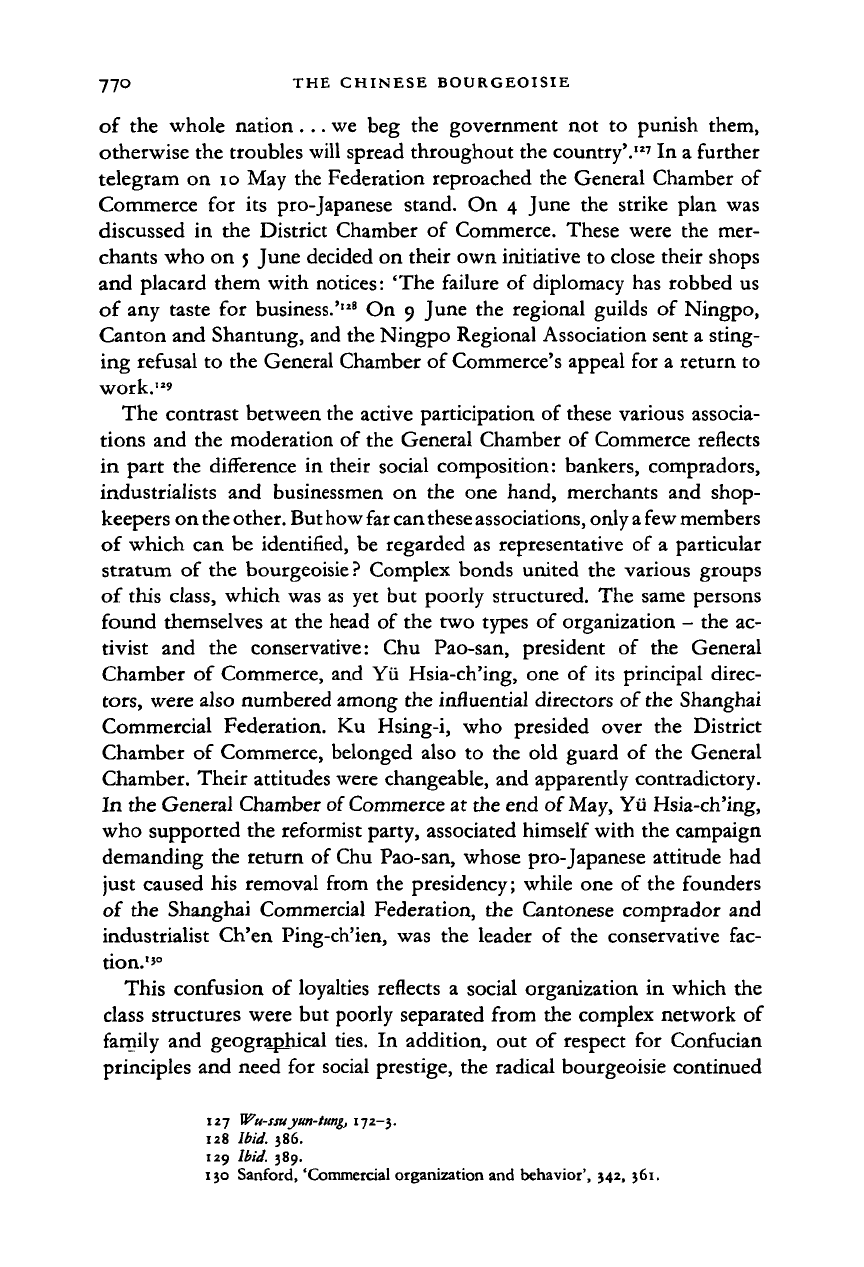
770 THE CHINESE BOURGEOISIE
of
the
whole nation... we
beg the
government
not to
punish them,
otherwise the troubles will spread throughout the country'."'
In a
further
telegram
on 10 May the
Federation reproached
the
General Chamber
of
Commerce
for its
pro-Japanese stand.
On 4
June
the
strike plan
was
discussed
in the
District Chamber
of
Commerce. These were
the mer-
chants who
on
5
June decided
on
their own initiative
to
close their shops
and placard them with notices:
'The
failure
of
diplomacy
has
robbed
us
of
any
taste
for
business.'
128
On 9
June
the
regional guilds
of
Ningpo,
Canton and Shantung, and the Ningpo Regional Association sent
a
sting-
ing refusal
to the
General Chamber
of
Commerce's appeal
for a
return
to
work.
12
"
The contrast between the active participation
of
these various associa-
tions
and the
moderation
of
the General Chamber
of
Commerce reflects
in part
the
difference
in
their social composition: bankers, compradors,
industrialists
and
businessmen
on the one
hand, merchants
and
shop-
keepers on the other. But how far can these
associations,
only
a
few members
of which
can be
identified,
be
regarded
as
representative
of a
particular
stratum
of the
bourgeoisie
?
Complex bonds united
the
various groups
of this class, which was
as yet but
poorly structured.
The
same persons
found themselves
at the
head
of
the
two
types
of
organization
- the ac-
tivist
and the
conservative:
Chu
Pao-san, president
of the
General
Chamber
of
Commerce,
and Yii
Hsia-ch'ing,
one of its
principal direc-
tors,
were also numbered among
the
influential directors
of
the Shanghai
Commercial Federation.
Ku
Hsing-i,
who
presided over
the
District
Chamber
of
Commerce, belonged also
to the old
guard
of the
General
Chamber. Their attitudes were changeable, and apparently contradictory.
In the General Chamber of Commerce
at
the end
of
May,
Yii Hsia-ch'ing,
who supported
the
reformist party, associated himself with
the
campaign
demanding
the
return
of
Chu Pao-san, whose pro-Japanese attitude
had
just caused
his
removal from
the
presidency; while
one of
the founders
of
the
Shanghai Commercial Federation,
the
Cantonese comprador
and
industrialist Ch'en Ping-ch'ien,
was the
leader
of the
conservative
fac-
tion.''°
This confusion
of
loyalties reflects
a
social organization
in
which
the
class structures were
but
poorly separated from
the
complex network
of
family
and
geographical ties.
In
addition,
out of
respect
for
Confucian
principles
and
need
for
social prestige,
the
radical bourgeoisie continued
127
Wu-ssuyun-tung,
172-3.
128
Ibid.
386.
129
Ibid.
389.
130 Sanford, 'Commercial organization and behavior',
342, 361.
Cambridge Histories Online © Cambridge University Press, 2008
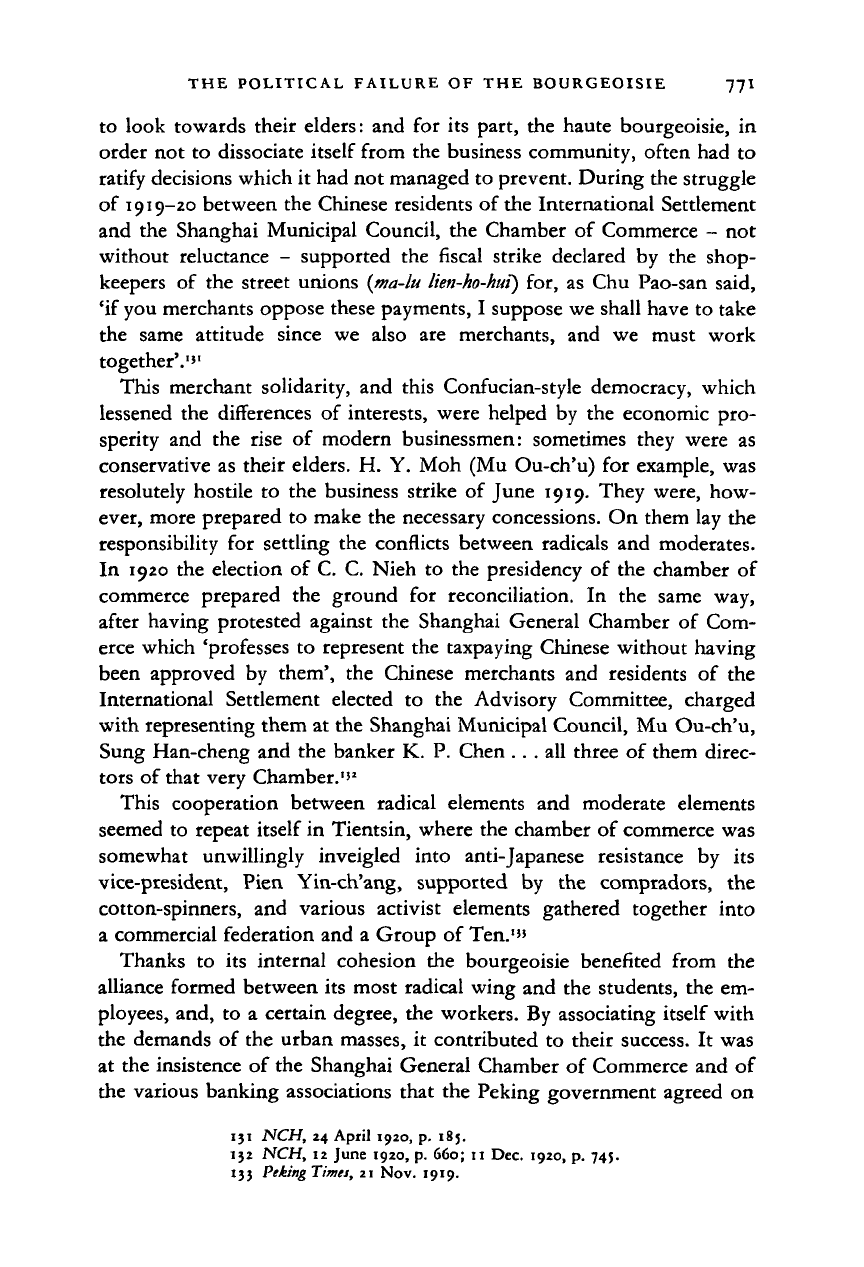
THE POLITICAL FAILURE OF THE BOURGEOISIE 77I
to look towards their elders: and for its part, the haute bourgeoisie, in
order not to dissociate itself from the business community, often had to
ratify decisions which it had not managed to prevent. During the struggle
of 1919-20 between the Chinese residents of the International Settlement
and the Shanghai Municipal Council, the Chamber of Commerce - not
without reluctance - supported the fiscal strike declared by the shop-
keepers of the street unions
{ma-lu lien-ho-hui)
for, as Chu Pao-san said,
'if you merchants oppose these payments, I suppose we shall have to take
the same attitude since we also are merchants, and we must work
together'.
1
'
1
This merchant solidarity, and this Confucian-style democracy, which
lessened the differences of interests, were helped by the economic pro-
sperity and the rise of modern businessmen: sometimes they were as
conservative as their elders. H. Y. Moh (Mu Ou-ch'u) for example, was
resolutely hostile to the business strike of June 1919. They were, how-
ever, more prepared to make the necessary concessions. On them lay the
responsibility for settling the conflicts between radicals and moderates.
In 1920 the election of C. C. Nieh to the presidency of the chamber of
commerce prepared the ground for reconciliation. In the same way,
after having protested against the Shanghai General Chamber of Com-
erce which 'professes to represent the taxpaying Chinese without having
been approved by them', the Chinese merchants and residents of the
International Settlement elected to the Advisory Committee, charged
with representing them at the Shanghai Municipal Council, Mu Ou-ch'u,
Sung Han-cheng and the banker K. P. Chen ... all three of them direc-
tors of that very Chamber.
1
'
2
This cooperation between radical elements and moderate elements
seemed to repeat itself in Tientsin, where the chamber of commerce was
somewhat unwillingly inveigled into anti-Japanese resistance by its
vice-president, Pien Yin-ch'ang, supported by the compradors, the
cotton-spinners, and various activist elements gathered together into
a commercial federation and a Group of Ten.'"
Thanks to its internal cohesion the bourgeoisie benefited from the
alliance formed between its most radical wing and the students, the em-
ployees, and, to a certain degree, the workers. By associating itself with
the demands of the urban masses, it contributed to their success. It was
at the insistence of the Shanghai General Chamber of Commerce and of
the various banking associations that the Peking government agreed on
131 NCH, 24 April 1920, p. 185.
152 NCH, 12 June
1920,
p.
660; 11 Dec.
1920,
p. 745.
133
Peking
Times,
21 Nov. 1919.
Cambridge Histories Online © Cambridge University Press, 2008
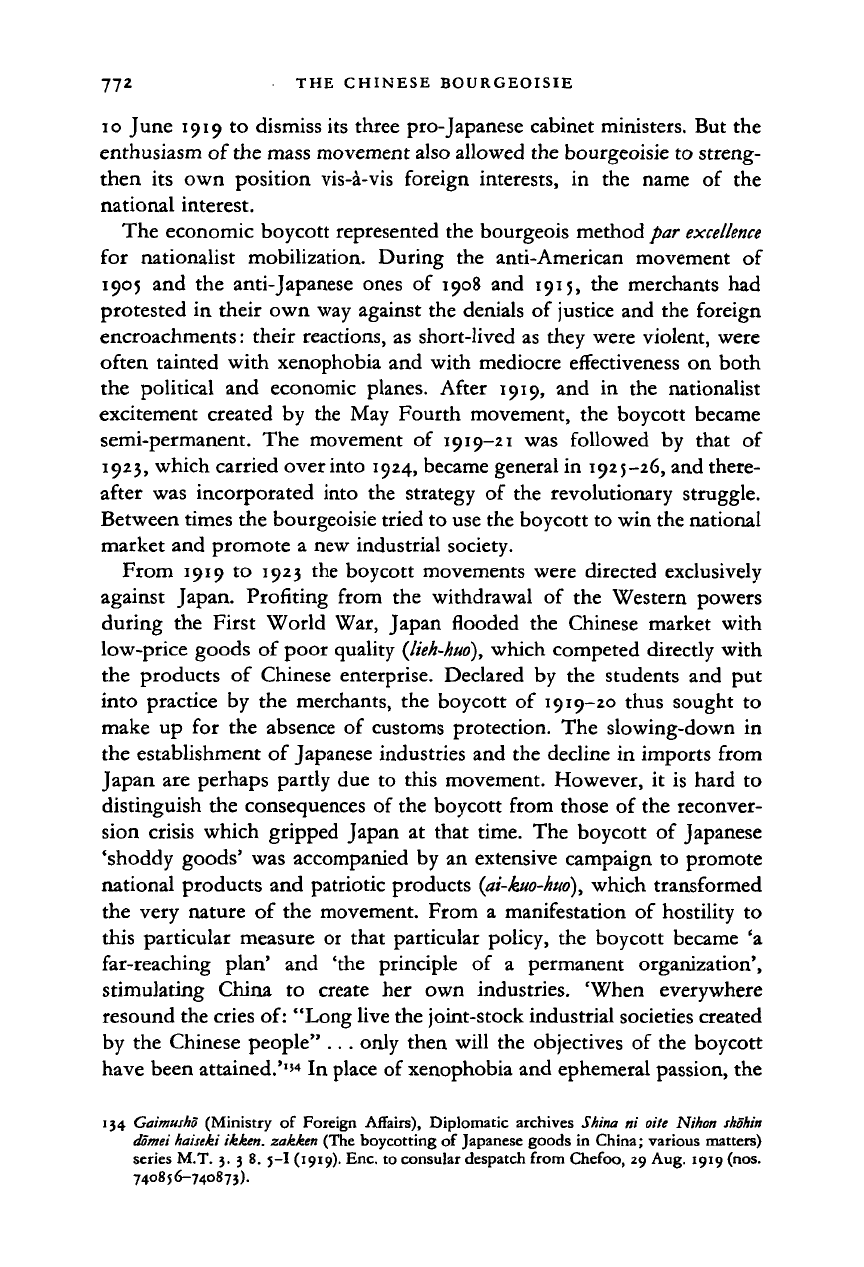
772 THE CHINESE BOURGEOISIE
10 June 1919 to dismiss its three pro-Japanese cabinet ministers. But the
enthusiasm of the mass movement also allowed the bourgeoisie to streng-
then its own position vis-a-vis foreign interests, in the name of the
national interest.
The economic boycott represented the bourgeois method par
excellence
for nationalist mobilization. During the anti-American movement of
1905 and the anti-Japanese ones of 1908 and 1915, the merchants had
protested in their own way against the denials of justice and the foreign
encroachments: their reactions, as short-lived as they were violent, were
often tainted with xenophobia and with mediocre effectiveness on both
the political and economic planes. After 1919, and in the nationalist
excitement created by the May Fourth movement, the boycott became
semi-permanent. The movement of 1919-21 was followed by that of
1923,
which carried over into 1924, became general in 1925-26, and there-
after was incorporated into the strategy of the revolutionary struggle.
Between times the bourgeoisie tried to use the boycott to win the national
market and promote a new industrial society.
From 1919 to 1923 the boycott movements were directed exclusively
against Japan. Profiting from the withdrawal of the Western powers
during the First World War, Japan flooded the Chinese market with
low-price goods of poor quality
(Jieh-huo),
which competed directly with
the products of Chinese enterprise. Declared by the students and put
into practice by the merchants, the boycott of 1919-20 thus sought to
make up for the absence of customs protection. The slowing-down in
the establishment of Japanese industries and the decline in imports from
Japan are perhaps partly due to this movement. However, it is hard to
distinguish the consequences of the boycott from those of the reconver-
sion crisis which gripped Japan at that time. The boycott of Japanese
'shoddy goods' was accompanied by an extensive campaign to promote
national products and patriotic products
(ai-kuo-huo),
which transformed
the very nature of the movement. From a manifestation of hostility to
this particular measure or that particular policy, the boycott became 'a
far-reaching plan' and 'the principle of a permanent organization',
stimulating China to create her own industries. 'When everywhere
resound the cries of: "Long live the joint-stock industrial societies created
by the Chinese people" .. . only then will the objectives of the boycott
have been attained.'
1
'
4
In place of xenophobia and ephemeral passion, the
134 Gaimusko (Ministry of Foreign Affairs), Diplomatic archives Shina ni oite Nihon
shohin
domei
haisiki ikktn. zakken (The boycotting of Japanese goods in China; various matters)
series M.T. 3. 3 8. 5-I (1919). Enc. to consular despatch from Chefoo, 29 Aug. 1919 (nos.
740856-740873).
Cambridge Histories Online © Cambridge University Press, 2008
